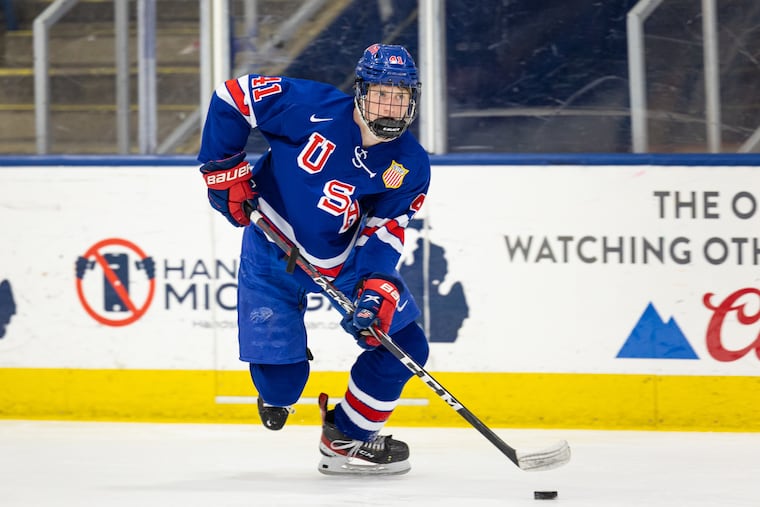NHL draft: Center Oliver Moore could fit the Flyers’ need for speed
Moore, 18, is widely considered the best skater in this year's draft class and would fit an organizational need as a center.

When Flyers governor and Comcast Spectacor CEO Dan Hilferty ushered in a “new era of orange” at the introductory press conference for general manager Danny Brière and president of hockey operations Keith Jones, he emphasized that the rebuilding team must embrace “today’s modern game” of “speed, power, and strategy.”
Outside of a handful of players including wingers Owen Tippett and Travis Konecny, the Flyers’ roster is in need of an infusion of speed. With that coveted trait in mind, the Flyers ought to consider Oliver Moore, a center with the U.S. National Team Development Program, when they make the No. 7 pick in the draft on June 28.
» READ MORE: Russian prospect Matvei Michkov presents a dilemma for every team — but even more so for the Flyers
Moore, NHL Central Scouting’s eighth-ranked North American skater, is widely regarded to be the fastest among this year’s crop of draft-eligible prospects and is expected to come off the board sometime in the first round. The 5-foot-11, 188-pound center stood out as a play-driver on the NTDP’s second line, collecting 31 goals and 75 points in 61 games (fourth in points behind the program’s top line of Gabe Perreault, Will Smith, and Ryan Leonard).
The Inquirer checked in with Chris Peters, an NHL draft and prospects analyst for FloHockey, to discuss Moore and his potential fit on the Flyers in the fifth installment of a six-part series evaluating whom the team could select at No. 7.
Strengths
Peters raved about Moore’s “elite” speed, including his explosive burst and his ability to get behind opposing defenses. He’s capable of leveraging his speed on defense, applying back pressure, and getting in on the forecheck quickly.
But aside from the speed that the 18-year-old displayed this season, Peters was impressed with Moore’s improved strength. Peters estimated that Moore gained about 20 pounds in the offseason last year, which should only be a benefit going forward.
“He’s not a huge guy,” Peters said. “So we’ve got another player that’s not the biggest player, but he really improved his physical makeup that allowed him to be a better defender. He’s an excellent penalty killer. He’s very smart with his decisions.”
Areas for improvement
According to Peters, Moore’s brain and hands are still catching up with his feet. Moore uses his speed all over the ice, but he’s still learning how to control his strongest asset and figure out when to use it.
Peters views Moore as a top-six player, possessing the versatility to play center at the NHL level. However, that projection is not a given, hinging on whether his skill can match his impressive skating.
“If those improve to a certain level, you’ve got a potentially massive threat, both offensively and at the other end of the ice, because he is so fast,” Peters said.
At the Under-18 World Championship, Peters expected Moore to impact the game more offensively. In seven games, Moore collected four goals and five assists, ranking sixth on the gold medal-winning team with nine points. During the NTDP season, Peters acknowledged that Moore didn’t have the linemates to support him at the same level offensively as the top trio of Perreault, Smith, and Leonard did. Still, Peters said that Moore will need to continue to work on driving the play and creating more offense before taking the jump to the professional level.
Fit for the Flyers
After witnessing long-term injuries to top centers Sean Couturier and Kevin Hayes over the last two seasons, the Flyers understand the importance of depth at the position. Adding Moore could help bolster the Flyers’ options up the middle in the future. Moore is set to head to the University of Minnesota for his freshman season, so he is at least a couple of years away from NHL readiness.
» READ MORE: Trade grades: How did new Flyers GM Danny Brière make out in the Ivan Provorov deal?
Peters emphasized the importance of speed in today’s NHL, which can compensate for a team’s weaknesses in other areas of the game. Moore possesses that speed in spades.
“If you play faster than the other team, if you create more opportunities to take the puck away from them, if you’re pressuring them on the forecheck, if you’re always on it and that’s something that I think Oliver Moore does well, is that he’s always on the puck, and he’s always hunting and making things difficult for the opposition,” Peters said. “That just makes your team that much more difficult to play against.”
NHL player comparison
Peters said Detroit Red Wings center Dylan Larkin is the type of player that Moore should strive to become. At 6-1, 198 pounds, Larkin is slightly bigger than Moore. However, they both boast staggering speed, which Larkin has been able to utilize in each phase of the game at the NHL level.